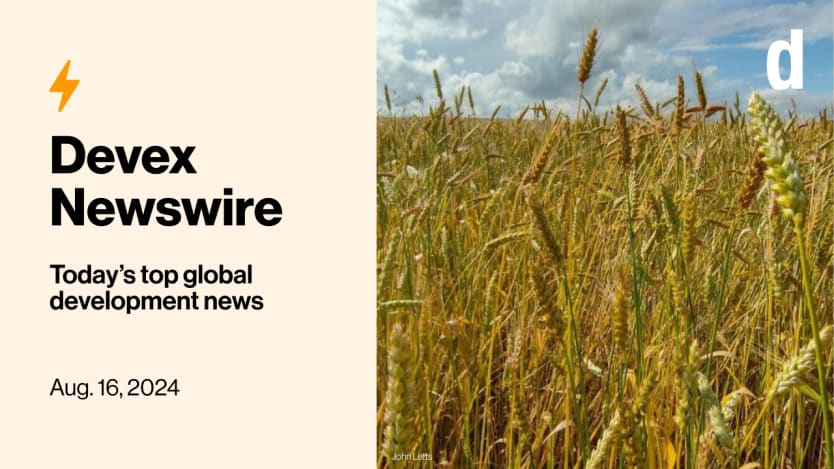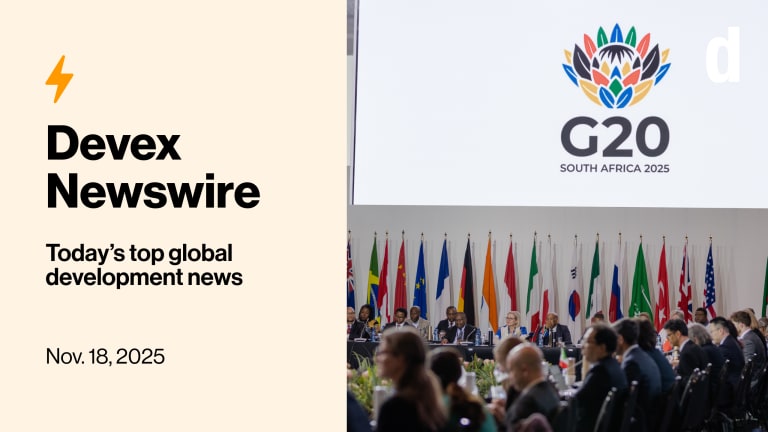
Farmers are turning to so-called heritage grains to help them cope with the swings in weather from climate change. These older varieties are better suited to unpredictable weather and offer a sustainable alternative to modern crops. But the move comes with some challenges.
Also in today’s edition: A major shift in Africa’s HIV cases, the OACPS Brussels HQ saga continues, and the U.K. gets an international development heavy hitter.
+Listen: For the latest episode of our podcast series, Devex’s Raj Kumar, Anna Gawel, and David Ainsworth discuss the mpox public health emergency, and other top global development stories from the week.
Old time grains
Record rainfall in the United Kingdom, attributed to human-induced climate change, has slashed winter wheat yields by up to 26.5%. Yet, for farmer John Letts, this year has been one of his most productive. He’s part of a growing movement of U.K. farmers turning to heritage grains — ancient varieties that thrive despite unpredictable weather.
Unlike modern monocrops dependent on chemical fertilizers, these diverse grains offer consistent yields and are better for the environment, Devex contributing reporter Catherine Davison writes.
This is a preview of Newswire
Sign up to this newsletter for an inside look at the biggest stories in global development, in your inbox daily.
Heritage grains, with their genetic diversity, adapt to varying conditions, providing resilience against climate shocks. This contrasts sharply with modern wheat, which, despite its high yields, is vulnerable to extreme weather, posing a risk to global food security.
The potential of ancient grains to enhance climate resilience and reduce emissions is gaining global attention. However, fears of reduced yields and profits, coupled with restrictive laws, hinder widespread adoption. Letts and others are pushing for change, promoting these grains through education and lobbying for legislative reform.
But, ultimately, the solution lies in market demand. Increasing consumer awareness and engagement with sustainable farming practices can drive the shift toward more resilient food systems. As climate change challenges modern agriculture, the revival of ancient grains offers a promising path forward.
Read: Could ancient grains hold answers to Britain's wheat crisis?
+ For more content like this sign up to Devex Dish, our free, must-read newsletter covering how agriculture, nutrition, sustainability, and more intersect to remake the global food system.
Global HIV shift
This past year marked a pivotal shift in the global HIV epidemic: for the first time, more new infections occurred outside sub-Saharan Africa than within it.
This highlights the success of sub-Saharan Africa's decadelong efforts to reduce transmission, but also exposes how other regions are falling behind. In 2023, HIV infections rose in Eastern Europe, Central Asia, the Middle East, North Africa, and Latin America, according to a report by UNAIDS.
Despite progress, sub-Saharan Africa still reported 1.3 million new HIV cases in 2023, far exceeding the 370,000 target for 2025. These figures underscore how off-track the world is from reaching key milestones to end AIDS as a public health threat by 2030.
By 2025, 95% of people with HIV should be diagnosed, 95% of those should be on treatment, and 95% of those treated should achieve viral suppression. "The world is not on track," warns UNAIDS Executive Director Winnie Byanyima, urging leaders to close the $9.5 billion funding gap and address the debt crisis hindering health investments in lower-income countries.
She also called on pharmaceutical companies to make groundbreaking HIV prevention tools affordable, especially for middle-income countries often excluded from generic agreements, Devex contributing reporter Andrew Green writes.
Despite challenges, Byanyima urged global leaders to choose solidarity, emphasizing that their actions could prevent millions of new infections, save lives, and ensure a healthier future for all.
Read: The AIDS epidemic is changing. Here's what it means
+ To keep up to date with all the front-line and behind-the-scenes reporting on global health, be sure to sign up to Devex CheckUp, our free newsletter on the subject.
Home improvements
We can report that surrealism is alive and well in Brussels. The empty headquarters of a once-proud, now-broke, development organization meant to represent global south voices to the European Union has been taken over by around 70 undocumented migrants and asylum seekers trying to avoid expulsion from the EU.
The EU just signed a new 20-year partnership agreement with the 79-nation organization, which the European Commission championed in the face of (many) skeptics, partly on the grounds that it would make it easier to expel failed migrants from Europe.
Financial management at the Organisation of African, Caribbean and Pacific States is also under the microscope after a series of embarrassing revelations by Devex, and the commission has suspended its vital funding of €46.7 million for the 2021-2027 period.
One major issue is the failure to renovate the group's headquarters on Avenue George Henri in the well-heeled suburb of Woluwe-Saint-Lambert. OACPS left the building in 2020 for renovations but didn’t even manage to publish a tender for the works. In the meantime, EU taxpayers have paid more than €6 million for OACPS to rent temporary offices. The current plan is to buy a new office, but the commission has knocked back everything OACPS proposes as too grandiose.
Belgian media, meanwhile, now report that the original, OACPS-owned office on Avenue George Henri, sitting unused since 2020, is now housing a collective of undocumented migrants and asylum seekers.
Last week, police visited the building at the request of OACPS with an expulsion notice. But my colleague Vince Chadwick hears the collective is still there — with the electricity running. No one answered his questions about who is picking up the bill. Belgian media outlet RTBF reported that the collective hopes to agree on a temporary lease with OACPS.
OACPS' roughly 50-member secretariat in Brussels might be busy, however, preparing for an "ad hoc summit" of its 79 members on the sidelines of the United Nations General Assembly next month. One observer tells Vince that it is now "past midnight" for the group. If its own countries won't up their contributions, the European Commission has made clear it is fed up with keeping OACPS on life support.
At a meeting of ministers from some OACPS countries in Brussels last month, the group wrote on the social media platform X that it had agreed on "limiting expenditure to essential operations." What were they doing before?
ICYMI: EU rebukes African, Caribbean, Pacific org ‘not aligned with reality’ (Pro)
+ A Devex Pro membership brings you essential analysis, data-driven funding insights, and access to the world’s largest global development job board. Experience these perks by signing up to our 15-day free trial.
The small print
The appointment of an international development heavy hitter to examine whether the U.K.’s delivery structure is fit for purpose should have been a significant announcement — but instead was buried in a resignation statement.
Minouche Shafik quit as Columbia University’s president on Wednesday, four months after she authorized police to arrest students at a Gaza war protest, having also faced criticism over the Ivy League institution's efforts to tackle antisemitism.
Shafik is a respected economist whose CV boasts stints at the World Bank, the International Monetary Fund — and as the top civil servant at the U.K.’s Department for International Development, a decade before its 2020 demise, my colleague Rob Merrick tells me.
In her statement, Shafik wrote: “I am honored to have been asked by the UK’s Foreign Secretary to chair a review of the government’s approach to international development and how to improve capability. I am very pleased and appreciative that this will afford me the opportunity to return to work on fighting global poverty and promoting sustainable development.”
However, there was only silence from Foreign Secretary David Lammy, who appeared to have been bounced into a premature announcement. Shafik’s exact remit, her review’s end date, and whether the role is full-time, or paid, are all unknown.
Critics of the new Labour government’s timid development stance since its July election victory will hope the review revives Lammy’s vague promise of “a new model” — a phrase apparently banished after the party also rejected bringing back a separate aid department.
Related: How David Lammy could bring real change to UK aid (Pro)
In other news
Sweden has identified its first case of mpox clade I, a more severe strain of the virus that had not been detected outside of Africa until now. [Al Jazeera]
A contentious security law in South Sudan that permits warrantless arrests has taken effect by default after President Salva Kiir failed to act on the bill within the 30-day constitutional deadline. [AP]
Japan lifted its megaquake alert after a week of monitoring but warned that the risk of a major earthquake persists. [The Japan Times]
Sign up to Newswire for an inside look at the biggest stories in global development.
Search for articles
Most Read
- 1
- 2
- 3
- 4
- 5








